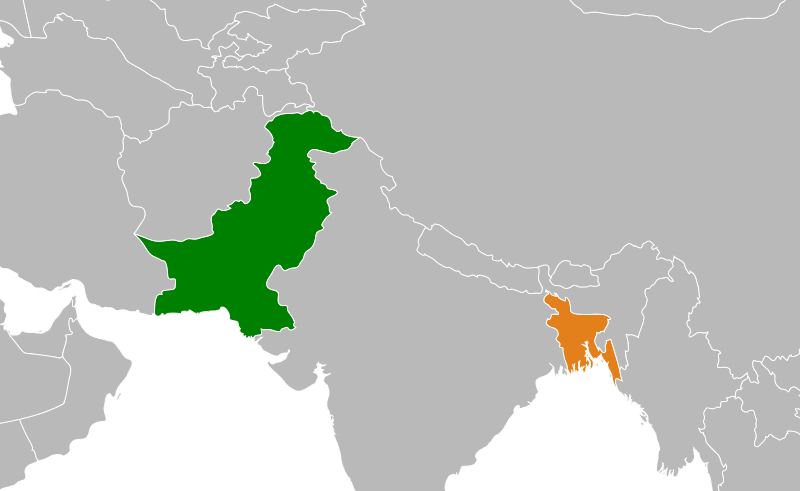
The evolving partnership between Pakistan and Bangladesh marks a decisive shift in South Asian geopolitics that has an impact on regional instability. The relationship between Pakistan and Bangladesh is marked by the 1971 Liberation War, in which West Pakistan committed genocide against the people of East Pakistan (now Bangladesh). Pakistan’s lack of a formal apology for these acts has deepened the resentment. Tensions were aggravated by the Bangladesh War Crimes Tribunal, which indicted individuals for crimes committed during the war. Pakistan strongly opposed the tribunal, calling the trial politically biased. This sparked official protests and worsened diplomatic relations. Although Pakistan officially recognized Bangladesh in 1974, relations between the two countries remained fragile.
The removal of Sheikh Hasina and her Awami League government after 15 years has changed Bangladesh’s political and diplomatic direction. Under Hasina, Bangladesh maintained close relations with India and focused on cooperation in trade, infrastructure and security. However, after the fall of Hasina, relations with India cooled down reflecting the growing anti-India sentiment among the Bangladeshi population in recent years. At the same time, Bangladesh has begun to develop relations with Pakistan. Pakistan’s previously strained relations with Bangladesh, including its strict visa policy and limited engagement, are now heading in a significantly different direction. The new partnership between Pakistan and Bangladesh focuses on easing visa policies, promoting bilateral trade, expanding educational exchanges, and intensifying defense cooperation. Bangladesh has even shown interest in acquiring JF-17 Thunder fighter jets from Pakistan.
The strengthening of relations between Pakistan and Bangladesh reflects the strategic needs of both countries. Bangladesh is looking to diversify its alliances as anti-India sentiment rises. Furthermore, the country is vulnerable due to reduced US support following Donald Trump’s presidency, which has removed the financial and diplomatic support Bangladesh once relied on. For Pakistan, the partnership offers an opportunity to counter long-term nemesis India’s dominance and gain strategic leverage in South Asia, particularly in India’s vulnerable northeastern region. Although Pakistan cannot compete with India economically, it is using mutual anti-India sentiments to fortify the alliance. This evolving partnership signals a shift in the regional power structure, with both nations seeking to advance their strategic objectives.
The evolving partnership between Pakistan and Bangladesh is changing the geopolitical balance in South Asia and has significant implications for India, China, and the United States. India, which has always been influential in Bangladesh’s defense and foreign policy, now faces growing concerns. Such concerns include the fear that Pakistan may use Bangladesh as a base to destabilize northeast India through a continuous supply of arms to groups like the Kukis in Manipur. Moreover, India fears that the release and proliferation of radical anti-India elements in Bangladesh will increase violence against Hindus and put pressure on India to intervene. As a strategic partner of both Pakistan and Bangladesh, China benefits from this trilateral axis. Increased arms transfers and infrastructure projects are challenging India’s regional supremacy in favor of China. However, the recent trade opportunity thaw in Sino-Indian relations could soften Beijing’s anti-India stance in Bangladesh. Meanwhile, under Trump’s presidency, the US has reduced its support for Bangladesh, leaving the country vulnerable to domestic political instability and external pressure.
The strengthening of relations between Pakistan and Bangladesh is significant but will probably not contribute to stability in South Asia. Instead, there is a danger that this alliance will exacerbate regional tensions. India will now exert more pressure on Bangladesh to contain Pakistan’s growing influence. Washington’s current withdrawal from Bangladesh only exacerbates this, as it leaves India unhindered to intervene both economically and diplomatically. Further, China’s position is strengthened, but China will foremost seek trade relations with India, leaving Bangladesh’s security needs vulnerable. As a result, Bangladesh will face increasing domestic instability, while the India-Pakistan-Bangladesh triangle will become a venue for increased military and intelligence maneuvering. Rather than promoting progress, these dynamics point to a future characterized by geopolitical friction and increased regional instability.
By The European Institute for International Relations















